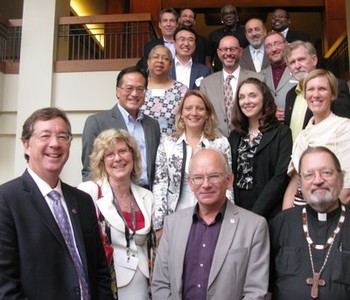Evangelism in new contexts was the focus of a meeting here last involving the World Council of Churches (WCC) and North American councils of churches. The meeting’s primary objective was to set the agenda for a larger consultation on evangelism in North America, slated before the end of 2015.
The meeting, titled “Joint Ecumenical Reflection on Evangelism in North America,” was held Sept. 28-Oct. 1 and was organized by the evangelism program of the WCC in cooperation with the National Council of Churches of Christ in the USA (NCCUSA) and in consultation with the Canadian Council of Churches (CCC).
The Presbyterian Church (U.S.A.) was represented by the Rev. Eric Hoey, director of Evangelism and Church Growth ministries for the denomination’s Presbyterian Mission Agency.
The question of understanding evangelism anew in light of rapidly changing cultural contexts is keenly felt by the churches in North America. “Without exception,” said James Winkler, general secretary of the NCCUSA, “we all agreed this to be an urgent matter at a time when so many are falling away from their faith in Christ. I am thankful to the WCC for bringing us together and to the CCC for being a partner in this endeavor.”
The Rev. Hielke Wolters, WCC’s associate general secretary for Mission and Unity, reflected on how we can “grow together towards a process of re-inventing Christian community life that is inspiring, serving and inviting.”
He said that “it was a great moment of grace to discover in this meeting the commitment of churches in the U.S. and Canada and their national councils to start together an ecumenical process of reflection on evangelism.”
The planned consultation will aim at comprehensive assessment with North American churches and ecumenical partners of the contemporary context for evangelism, especially within secular multi-cultural and multi-religious settings.
Along with this context, the consultation will analyze the new expressions of Christian witness and their implications of new models of evangelism for theological education and missiological formation.
“Christians are called to speak and act the Good News of Jesus Christ in the world,” said the Rev. Karen Hamilton, general secretary of the CCC. She asked, “What are the crucial issues for Canadian and American denominations to reflect, strategize and act on in terms of evangelism in our current context?”
Hamilton expressed her hopes that the conference “will be a comprehensive, reflective, self-critical definition of how North American churches witness their faith.”
Rev. Dr Jooseop Keum, secretary of the WCC’s Commission on World Mission and Evangelism, saw the effort as an opening of vistas for other churches as well. “The changing landscape of church and society in North America provides an opportunity for fresh thinking and practice of evangelism,” he said. Keum emphasized that the CWME will evolve special focus on evangelism and discipleship in the process of implementing the mission statement Together Towards Life: Mission and Evangelism in Changing Landscapes.
Kyriaki Avtzi, WCC programme executive for evangelism commented, “This joint ecumenical reflection has set the promising foundation for a meaningful and fruitful gathering of North American churches in the coming year. Participants discussed in-depth the place that evangelism holds both in the US as well as in the Canadian contexts and affirmed the importance of addressing major aspects of evangelism through an ecumenical gathering in 2015. A preparatory working group has been formed and is about to begin its deliberations on the future event.”

